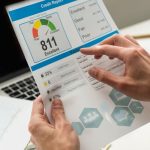Inflation can feel like an invisible force—one that slowly chips away at your purchasing power without making a sound. You might notice your grocery bill creeping higher, or that your paycheck doesn’t go as far as it used to. That’s inflation at work.
At its core, inflation means prices are rising. But its effects reach far beyond the cost of milk and bread. From rent to retirement savings, inflation touches nearly every corner of our daily lives. Here’s a breakdown of how inflation affects you—and what you can do about it.
Rising Prices on Everyday Essentials
One of the first places people feel inflation is at the grocery store. Food prices tend to rise quickly when inflation kicks in, especially for:
-
Fresh produce
-
Meat and poultry
-
Packaged goods and snacks
-
Coffee and dairy
Inflation doesn’t just make individual items more expensive—it can also shrink product sizes while keeping prices the same (a sneaky tactic known as “shrinkflation”).
Beyond food, you’ll notice increases in:
-
Gasoline
-
Electricity and utility bills
-
Household goods like toilet paper or detergent
-
School supplies and personal care products
When prices rise faster than your income, it becomes harder to afford the same lifestyle.
Rent and Housing Costs Get More Expensive
Inflation can cause rent and home prices to increase as the cost of materials, labor, and land go up.
For renters:
-
Lease renewals may come with steep price hikes
-
Affordable housing becomes more competitive
-
Utilities may rise alongside base rent
For homeowners:
-
Home values may increase, but so might mortgage interest rates
-
Property taxes often rise with assessed value
-
Maintenance and renovation costs climb due to pricier materials
Inflation turns housing—whether you rent or own—into a bigger slice of your monthly budget.
Transportation Becomes Less Affordable
If you drive, take public transit, or even rely on delivery services, inflation can change how much you spend getting from point A to point B.
Common changes include:
-
Higher gas prices
-
Rising car insurance premiums
-
Costlier car repairs and parts
-
More expensive rideshares or delivery fees
Even public transportation can increase fares in response to rising operational costs. When getting around costs more, it can limit job opportunities or lead people to cut back on outings.
Paychecks Lose Purchasing Power
If your salary or hourly wage stays the same while prices rise, you’re essentially earning less. Even a modest 3–5% inflation rate can erode your income quickly.
Effects include:
-
Less leftover money after bills
-
Harder time saving for big goals
-
A sense of “working harder but falling behind”
Unless wages increase at the same pace as inflation (or faster), many workers feel the financial squeeze.
Borrowing Gets More Expensive
Inflation often prompts central banks (like the U.S. Federal Reserve) to raise interest rates. That means loans become more expensive.
You may notice:
-
Higher credit card interest rates
-
More costly mortgages or refinancing
-
Bigger monthly payments on car loans or student loans
-
Business loans with steeper terms
If you’re carrying debt or planning a big purchase, inflation-linked rate hikes can significantly impact your bottom line.
Savings Lose Value Over Time
Inflation doesn’t just affect what you spend—it impacts what you save. When inflation rises faster than the interest earned on savings accounts, the real value of your money drops.
Example:
-
If you earn 1% interest but inflation is 4%, you’re effectively losing 3% of your money’s value every year.
To fight this erosion, savers often seek higher-interest options like:
-
High-yield savings accounts
-
Treasury Inflation-Protected Securities (TIPS)
-
Investments in stocks or real estate
But for those keeping large amounts of cash in low-interest accounts, inflation can be a silent wealth killer.
Budgets Get Tighter
As prices rise across categories, households often need to adjust their budgets just to stay afloat. That might mean:
-
Cutting out entertainment or eating out
-
Postponing vacations or big purchases
-
Canceling subscriptions
-
Reducing savings contributions
For many families, inflation forces tough decisions about where to cut back—even when incomes stay steady.
Impact on Retirement Planning
Inflation has a long-term effect on retirement savings. If you’re not planning for rising costs, you may find yourself underprepared when it’s time to retire.
Challenges include:
-
Needing a larger nest egg to maintain your lifestyle
-
Watching the real value of fixed pensions or annuities shrink
-
Healthcare costs outpacing inflation
Investing in inflation-resistant assets becomes crucial for those planning decades ahead.
Education Costs Keep Rising
Tuition, school supplies, books, and extracurricular costs often rise with inflation—or faster. Parents and students face higher bills whether attending public or private institutions.
This can lead to:
-
More student debt
-
Greater reliance on scholarships or financial aid
-
Families delaying or reconsidering higher education
Inflation can limit educational choices and increase the pressure on families to save more, earlier.
Psychological and Emotional Impact
Inflation doesn’t just strain wallets—it can create stress, anxiety, and a sense of instability.
Common emotional effects:
-
Worry about affording basic needs
-
Guilt about cutting family spending
-
Fear about long-term financial goals
-
Pressure to work more just to stay even
These feelings are valid and widespread. The emotional toll of inflation often mirrors the financial burden.
What You Can Do About Inflation
While you can’t stop inflation, you can take steps to protect yourself from its impact.
Practical strategies include:
-
Track your expenses closely and adjust your budget regularly
-
Use coupons, cashback apps, and loyalty programs to offset rising costs
-
Negotiate bills and insurance for better rates
-
Limit high-interest debt and pay it off quickly
-
Invest in inflation-resistant assets like stocks, real estate, or TIPS
-
Build an emergency fund that keeps up with inflation
Most importantly, stay informed. Understanding how inflation works helps you make smarter financial decisions in a changing economy.
Inflation affects every corner of everyday life—from how much you pay at the grocery store to how far your paycheck stretches. While it’s largely outside your control, you can adapt. By staying aware, planning ahead, and making strategic financial moves, you can protect yourself and your family from the worst effects of rising prices.
Inflation is part of the economic cycle—but with smart habits, you can stay one step ahead.



